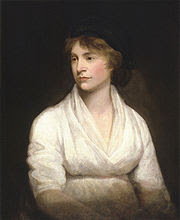
Introduction to Philosophy – Mary Wollstonecraft’s A Vindication of the Rights of Woman
Immanuel Kant was perhaps the quintessential Enlightenment thinker, exalting in his philosophy the guiding principle of human rationality. And yet, his reputation as a fierce misogynist reveals much about the prevailing irrationality concerning women’s rights in the seventeenth century. For when Descartes, Kant and others wrote of the existence of a rational soul and the power of human reason, in many ways they were not describing faculties of what they might label, “the fairer sex”. At home or in public, both intellectually and spiritually, women were subordinate to men. It was into this world of gender prejudice and fierce subjugation of women that Mary Wollstonecraft was born; and during her thirty-eight years on earth, she would challenge cultural mores, successfully enter the male-dominated world of rational discourse, and publish the pioneering text for feminism.
The English philosopher, teacher and writer, Mary Wollstonecraft was born in 1759.
Wollstonecraft is an Enlightenment thinker. She consistently appeals to “the Law of Nature” (p.7); “Reason…the perfection of our nature and capability of happiness” (p.11); “Exercise of reason, knowledge and virtue” (p.11); “against the monarchy” (p.12); “the sober light of Reason” (p.35); “…my soul and sufficient strength of mind” (p.35); “universal rule of right, virtue and duty” (p.35); “Liberty is the mother of virtue” (p.36)
The Argument
P1: If women are educated, that is, their natural reason is cultivated; then, they will make better wives, mothers and citizens.
P2: If women are better wives, mothers and citizens, then men will be better husbands, fathers and citizens.
P3: If men and women are better citizens, then society as a whole will benefit.
Therefore, women should be educated, that is, their natural reason should be cultivated.
Wollstonecraft never compares men and women, that is, she never tries to prove that they are equal. Rather, she argues that denying women an education is actually a detriment to men, society and ultimately to God. (p.34)
Chapter I-II (pp.1-36)
First Argument
“Ignorance under the specious name of innocence” (p.18)
John Milton
Second Argument
“Manners before morals…” (p.22)
Example of the military
Third Argument
“Woman should never feel herself independent” (p.25)
Rousseau
Moses
Fourth Argument
“…the whole tendency of female education ought to be directed to one point- to render them pleasing.” (p.26)
Dr. Gregory’s book - “fondness for dress.” (p.27)
Fifth Argument
“Friendship or indifference inevitably succeeds love.” (p.29)
“Companionship vs. Contempt” (p.33)

No comments:
Post a Comment